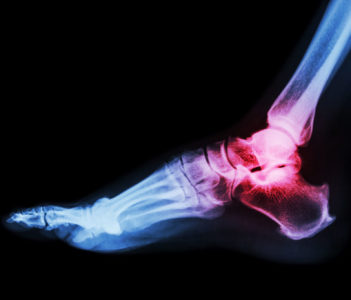 The fusion of multiple bones in the foot or ankle is a complex surgery, and healing takes some time after the last suture is stitched. For most individuals, fusion healing takes between 6-10 weeks depending on the specific operation, but some people need more time to recover. When healing takes longer than expected, it is classified as a delayed union.
The fusion of multiple bones in the foot or ankle is a complex surgery, and healing takes some time after the last suture is stitched. For most individuals, fusion healing takes between 6-10 weeks depending on the specific operation, but some people need more time to recover. When healing takes longer than expected, it is classified as a delayed union.
Delayed unions can occur for a number of reasons, some of which are controllable by the patient, while others are not. Below, we take a closer look at five common reasons why you may experience a delayed union, and we share how doctors work to address these potential problems.
Common Reasons For Delayed Union After Fusion Surgery
Here are five common reasons why you might experience a delayed union or a non-union (more than six months without fully healing) after a foot or ankle fusion procedure:
1. Smoking – Smoking greatly inhibits healthy blood flow to your extremities, which is essential when you’re recovering from a fusion operation. Estimates suggest that smokers are three times more likely to suffer a non-union of the fusion than non-smokers. If you know you need a fusion operation and you are a smoker, it is imperative that you do everything in your power to kick the habit.
2. Poor Immobilization – Another common reason for delayed union after a fusion operation is because the surgical site was poorly immobilized or the patient tried to get back to normal activities before healing had run its course. Heed your doctor’s instructions when it comes to immobilization and weight bearing after a fusion operation.
3. Diabetes – Diabetes is another risk factor for a delayed or non-union of a fusion. Diabetes affects how blood flows through our feet, and if enough healthy blood isn’t reaching the area, union will be delayed or stop short of a full recovery. It is very important to be diligent about maintaining your blood sugar levels leading up to and after a fusion operation.
4. Inadequate Blood Supply – Inadequate blood supply to the fusion site can occur as a result of issues other than smoking or diabetes, although they are likely the most common. If a previous health condition has affected your circulatory system, you may experience delayed healing.
5. Previous Failed Union – If you are undergoing a second operation because the first union failed for one reason or another, you are at an elevated risk for suffering a subsequent delayed union or non-union of the fusion. This suggests that there is an unresolved issue that needs to be addressed or better controlled for the second time around.
For more information about why your healing after fusion surgery may be delayed, reach out to Dr. Silverman, or drop us a line in the comments section!